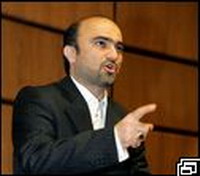Iranian envoy is due in Vienna to provide answers on past nuclear activities
After years of stonewalling, a senior Iranian envoy is due in Vienna for talks that could give answers on past nuclear activities to the U.N. nuclear monitoring agency investigating its atomic program.

The diplomats, who demanded anonymity because their information was confidential, said Iranian negotiator Javad Vaedi was set to meet with Olli Heinonen, a senior official of the International Atomic Energy Agency, as early as Monday.
That meeting was scheduled to be held after Vaedi meets in the Austrian capital with senior European Union negotiator Robert Cooper in a follow-up to May 31 talks in Madrid between EU foreign policy chief Javier Solana and Ali Larijani, Iran's top nuclear negotiator.
Those discussions ended with Tehran offering to divulge information long sought by IAEA experts in their efforts to establish whether the Islamic republic was secretly trying to make nuclear weapons.
The IAEA's 35 nation board starts a meeting on Monday. Just two weeks ago, the IAEA reported that Iran had assembled more than 1,600 centrifuges in series at its underground facility at Natanz, and that most of them were being used to churn out small amounts of fuel-grade uranium. On Sunday, one of the diplomats said that number had now risen to more than 2,000 centrifuges and was expanding by about 300 centrifuges a week.
Iran's ultimate stated goal is running 54,000 centrifuges to churn out enriched uranium - enough for dozens of nuclear arms a year. But even an assembly of 3,000 of the machines can produce enough material for one such weapon within a year.
Iran insists it wants the technology only to meet future power needs and argues it is entitled to enrich uranium under the Nuclear Nonproliferation Treaty.
But suspicions bred by nearly two decades of clandestine nuclear activities, including black-market acquisitions of equipment and blueprints that appear linked to weapons plans, have led to two sets of U.N. sanctions over its refusal to freeze enrichment.
An IAEA report, sent to the Security Council May 23, formally gave the green light for new U.N. sanctions through its finding that Tehran continued to expand enrichment instead of complying with Council demands that it be fully curtailed.
Still, the diplomats said that - with lack of unity on what kind of new sanctions should be imposed and how quickly - the United States was looking for new evidence of Iranian nuclear defiance to shore up support for such punishments later this year.
That could be provided by Iran's decision earlier this year to abrogate part of an agreement linked to the Nuclear Nonproliferation Treaty under which Tehran is obligated to report to the agency as soon as it decides to build new nuclear facility or expand an existing one. Tehran subsequently cited this move in denying IAEA inspectors a visit to its Arak heavy water reactor that will produce plutonium - like enriched uranium a possible pathway to nuclear arms - once completed sometime in the next decade.
One of the diplomats said that the Americans failed to get support for an IAEA board resolution at the meeting starting Monday stating that Iran's refusal to allow inspections of Arak was in noncompliance of its NPT obligations. But, he said they would continue to press their case during the meeting in hopes of increasing Security Council sentiment for new sanctions.
The main opponents of U.S. efforts to move quickly to a third set of U.N. sanctions are China and Russia, the diplomats - all of them involved in international attempts to persuade Tehran to give up uranium enrichment - said.
Beijing is traditionally opposed to such punishment and is additionally increasingly dependent on Iranian gas and oil, said the diplomats, who demanded anonymity in exchange for discussing confidential information.
Russia, which also has economic and strategic links to Iran, also has acted as a drag to U.S. efforts over the past year to impose harsh U.N sanctions. Most recently, that resistance has been stiffened by Moscow's displeasure over Washington's plans to install a missile defense system in Poland and the Czech Republic despite American insistence that it is meant to protect against Iranian, and not Russian missiles.
"The issues are formally separate," said one of the diplomats of the attempts to contain Tehran's nuclear ambitions and the dispute over the missile defense shield. "But in reality they are, of course, interconnected."
Attempts to return to negotiations meant to persuade Iran to shelve its enrichment plans in exchange for economic and political rewards are also at a standstill.
One of the diplomats, who is familiar with recent talks between top EU foreign policy official Javier Solana and Ali Larijani, Iran's senior nuclear envoy, confirmed Arab media reports that Larijani had asked - in vain - to be relieved of his duties four times in recent months because of frustrations with hardline Iranian President Mahmoud Ahmadinejad.
But Solana, who represents the five permanent Security Council members and Germany in his talks with Larijani, also has little room to maneuver. The U.S., France and Britain continue to insist that Tehran must impose a full freeze on enrichment activities as a precondition for formal negotiations between Iran and the six world powers.
Subscribe to Pravda.Ru Telegram channel, Facebook, RSS!





